-
Texas sees rise in number of border crossers dying in the summer heat
During the hot summer months, dozens of migrants die trying to cross the southern border in Arizona and California. Now, Texas is seeing an increase in the number of immigrant dying as they cross the U.S.-Mexico border and lose their way in the desert.
-
-
States eager to attract cybersecurity companies
As the threat of cyberattacks grows, Maryland, Washington D.C., and Virginia want to cash in on the growing business of cybersecurity. Analysts say that several states are using tax breaks to get in on the $207 billion cybersecurity industry, which is expected to show “impressive growth” in the next five years.
-
-
Nevada Sheriff wants DHS to do more before, rather than after, attacks
Clark County, Nevada, Sheriff Doug Gillespie says DHS needs to make a bigger effort to help local law enforcement work on preventing terrorist attacks, instead of responding to them after the fact. Gillespie used the Boston Marathon bombings as an example of the importance of prevention efforts, noting that the response to the attacks was handled well, but that people were already killed and injured.
-
-
USDA announces additional emergency watershed protection funding
USDA’s Natural Resources Conservation Service will send an additional $66.8 million in Emergency Watershed Protection Program funds to help disaster recovery efforts in fifteen states.
-
-
States move to draft their own drone laws

Advances in drone technology and drop in prices have led media and other organizations, and even private citizens, to purchase drones to do their own investigations. Several states have now drafted their own drone laws.
-
-
Newark to raise water rates to pay for infrastructure
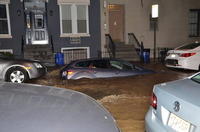
A report presented to Newark’s city council said that the town’s water and sewer rates will be increased by more than 60 percent over the next ten years in order to pay for $500 million in infrastructure repairs to the town’s faulty and outdated meters, century-old, leaky pipes, and broken valves.
-
-
Texas to appeal FEMA decision not to declare West, Texas a disaster area
The Federal Emergency Management Agency (FEMA) said President Obama would not declare West, Texas a disaster area in the wake of the massive fertilizer plant explosion there two months ago, and Texas governor Rick Perry is not happy. FEMA said Texas did not make the case the state lacked funds for cleanup and recovery efforts.
-
-
New Jersey faces costly water infrastructure upgrades
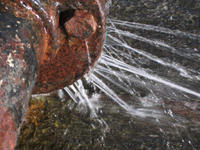
Before Hurricane Sandy hit New Jersey, state officials knew they had much work ahead of them to update the state’s water infrastructure. The damage Sandy inflicted only highlighted the inadequacies of New Jersey’s outdated wastewater, stormwater, and drinking water infrastructure. Upgrading the system will be costly, but not doing so will be costlier.
-
-
Justice Department endorses NYPD’s stop-and-frisk
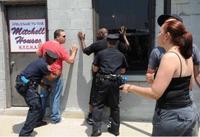
The Justice Department (DOJ) has entered the debate on the New York Police Department’s stop-and-frisk policy, telling a federal judge that DOJ endorses the program as long as there is independent oversight to monitor changes in the policy if civil rights violations occur.
-
-
California’s San Onofre nuclear power plant retired due to safety concerns
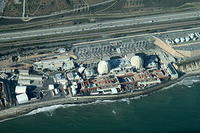
Southern California Edison (SCE) has decided it will retire the San Onofre nuclear power plant located on the California coast. The decision comes after officials debated for over a year whether the twin reactors could be safely restarted. The power plant is located in a populated area, with millions living near it.
-
-
Nevada lawmakers fail to restore DHS funds to Las Vegas
Members of the Nevada congressional delegation were taken aback when they found that Las Vegas would lose DHS funding for anti-terror programs, and immediately began to work their fellow lawmakers on the Hill to add money to DHS security grants to cities. The effort failed, and Las Vegas will have to find other sources of funding for some of the city’s security programs.
-
-
Iowa City to ban red-light cameras, drones, license plate readers
Iowa City could become the first city in the United States to issue a sweeping ban on three law-enforcement technologies: drones, license plate readers, and red-light cameras. Privacy advocates say each of these technologies poses a threat to privacy, and the cumulative effect of using all three would turn America into a surveillance society.
-
-
Thousands of U.S. bridges in “fracture critical” condition
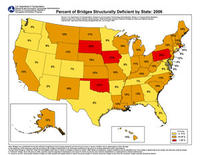
There are currently 66,749 structurally deficient bridges and 84,748 functionally obsolete bridges in the United States – about a quarter of the nation’s 607,000 bridges. With declining federal funds for bridge repair, the burden of maintenance has shifted to states, which spent $28.5 billion last year on bridge work – up from $12.3 billion in 1998.
-
-
California Democratic lawmakers want a go-slow approach to fracking
California may be on the verge of an oil rush. It is estimated that hydraulic fracturing, or fracking, at the Monterey Shale formation may tap reserves of fifteen billion barrels of oil. Democratic lawmakers do not see it that way, and have proposed numerous anti-fracking bills aiming to control the use of the controversial technology. Ten bills have been tabled so far, and more are on the way.
-
-
DHS cuts funding for Las Vegas’ terrorism-related programs
Federal aid to terrorism-related programs in Las Vegas has been steadily decreasing in recent years. Next year, the city which boasts fifteen of the world’s largest hotels, and which is home to more than forty million tourists a year, will no longer receive any DHS funds for terrorism-related security programs.
-
More headlines
The long view
Smaller Nuclear Reactors Spark Renewed Interest in a Once-Shunned Energy Source
In the past two years, half the states have taken action to promote nuclear power, from creating nuclear task forces to integrating nuclear into long-term energy plans.
